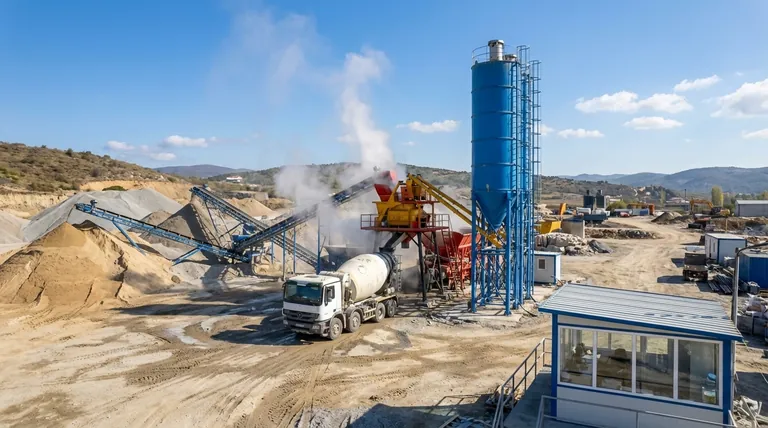At its core, the concrete mixing process in a batching plant is a highly controlled, automated sequence of operations. It begins with feeding raw materials like aggregates, sand, cement, and water into the system, precisely weighing each component, transferring them to a central mixer for a specified time, and finally discharging the uniform, high-quality concrete into a transport vehicle.
The fundamental purpose of a concrete batching plant is to replace manual guesswork with automated precision. Its entire process is designed to guarantee that every single batch of concrete meets exact specifications for strength, consistency, and quality.

The Four Core Stages of Concrete Batching
The entire operation can be broken down into a clear, linear progression from raw materials to a finished product, managed by a central control system.
Stage 1: Preparation and Material Feeding
The process starts with storing the raw ingredients. Aggregates (stone) and sand are kept in large, separate bins.
Cement and other powders like fly ash are stored in tall, protected silos to keep them dry. Water and chemical admixtures are held in their own tanks.
Stage 2: Precise Weighing
This is the most critical stage for ensuring concrete quality. The automated control system calls for the specific amounts of each material required by the mix design.
Aggregates are released from their bins onto a weighing conveyor or into a weigh hopper. Cement, water, and admixtures are all weighed separately using highly accurate scales. This precision is what guarantees batch-to-batch consistency.
Stage 3: The Central Mixing Stage
Once weighed, all the ingredients are transferred into the plant's core component: the mixer unit.
Inside the mixer, the materials are rotated and blended for a carefully controlled period. This mechanical action ensures every particle of sand and aggregate is evenly coated with cement paste, creating a truly homogeneous mixture.
Stage 4: Discharging the Final Product
After the mixing cycle is complete, the finished concrete is discharged from the mixer.
It flows down a chute directly into a transit mixer truck or a concrete pump. The concrete is now ready to be transported to the construction site for immediate use.
Common Pitfalls in Batching Plant Operation
While the process is automated, its success hinges on proper calibration and management. Overlooking key details can severely compromise the quality of the final product.
Inaccurate Weighing
The entire basis for modern concrete strength is a precise recipe. If the weighing systems are not properly calibrated, the water-to-cement ratio can be thrown off, leading to weak or inconsistent concrete that fails to meet engineering standards.
Improper Mixing Time
Under-mixing results in a non-uniform product where some parts have too much aggregate and others have too much cement paste. Over-mixing can begin to break down aggregates or needlessly waste energy and time, reducing plant efficiency.
Poor Material Management
Using contaminated aggregates or damp cement can ruin a batch before it even starts. Proper storage and handling of raw materials are just as crucial as the mixing process itself to ensure the concrete performs as designed.
Making the Right Choice for Your Goal
Understanding this process allows you to focus on the elements that matter most for your project's success.
- If your primary focus is structural integrity: The precision of the automated weighing systems and the reliability of the control system are paramount for guaranteeing consistent mix design.
- If your primary focus is project efficiency: The plant's ability to rapidly and repeatedly execute the entire cycle—from feeding to discharging—is what accelerates construction timelines.
- If your primary focus is quality control: The centralized mixing process, especially in a wet mix plant, ensures every cubic meter of concrete is uniform before it ever leaves for the job site.
Ultimately, mastering the principles of the batching process empowers you to produce concrete that is not just a material, but a predictable and reliable engineering component.
Summary Table:
| Stage | Key Action | Outcome |
|---|---|---|
| 1. Preparation | Materials (aggregates, cement, water) are stored separately. | Organized, ready-to-use raw materials. |
| 2. Weighing | Each component is precisely measured by an automated system. | Guaranteed adherence to the mix design for strength. |
| 3. Mixing | Materials are blended in a central mixer for a set time. | A uniform, homogeneous concrete mixture. |
| 4. Discharging | Finished concrete is released into a truck or pump. | Product ready for immediate transport and use. |
Produce Consistent, High-Strength Concrete with GARLWAY
For construction companies and contractors, predictable results and on-time project delivery are non-negotiable. GARLWAY specializes in construction machinery, offering reliable concrete batching plants that automate the entire mixing process, eliminating guesswork and ensuring every batch meets your exact specifications.
Our plants are engineered for:
- Unmatched Precision: Advanced weighing systems guarantee the correct water-to-cement ratio for consistent strength.
- Superior Efficiency: Rapid, automated cycles from feeding to discharging keep your project on schedule.
- Total Quality Control: Centralized mixing delivers a uniform product, batch after batch.
Ready to enhance your concrete production? Contact our experts today to find the perfect batching plant solution for your needs.
Visual Guide

Related Products
- HZS120 Ready Mix Concrete Batching Plant Commercial Mud Cement Mixer
- JW1000 Mobile Cement Mixer Concrete Mixer Truck and Batching Plant
- Hydraulic Concrete Mixer Machine Cement Mixing Equipment for Mixture Concrete
- HZS75 Concrete Batching Plant Cement Mixer Price Concrete Mixer Bunnings Mixing Plant
- HZS35 Small Cement Concrete Mixing Batch Plant
People Also Ask
- How does a ready-mix concrete plant work? A Guide to Efficient, High-Quality Production
- What are the advantages of a concrete plant? Achieve Consistent Quality & Efficiency for Large-Scale Projects
- How do you maintain a concrete batching plant? Maximize Uptime & Extend Equipment Life
- How to make ready mix concrete stronger? Boost Strength with Proven Mixing Techniques
- What are the advantages of ready mix concrete? Higher Quality, Efficiency & Cost Savings



















